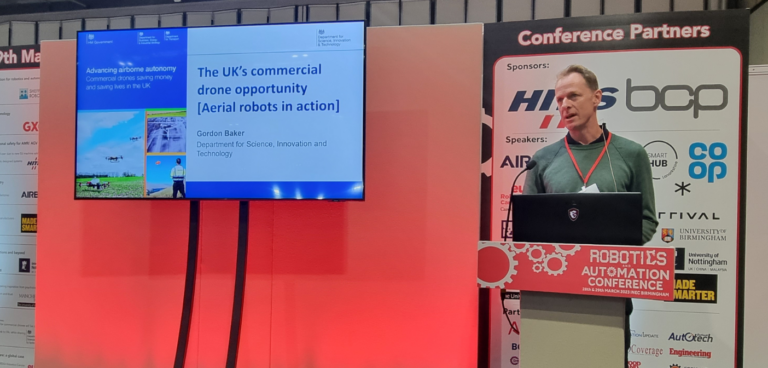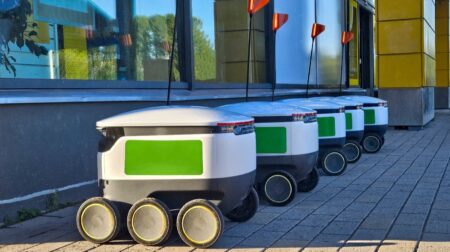Gordon Baker, policy lead for robotics at the UK Department of Science, Innovation & Technology (DSIT) kicked off the session with a brief overview of the government perspective on the use of robotics and drones and the recent forming of DSIT itself, which was formerly BEIS.
This new body, Baker said, encompasses a new agenda, with a new science and technology framework being published earlier this month to set the story for UK use of robotics, including the deployment of drones. Baker highlighted that, going forward, a key part of its approach will be “all about translation of world-class research into technology and solutions for the future” and leading the way for technology organisations, government and society all cooperating.
Baker then mentioned the critical nature of trust and capability as part of encouraging public and human-robot acceptance of robotics, offering a synopsis of some of the significant government programmes looking to improve this area. He mentioned that, while logistics and manufacturing use cases are well established, there are new capabilities emerging as “robots are coming out of factory settings into all parts of society”. For him, technology that provides new smart capabilities, such as swarm and collaboration, to make robots work better, and often as systems rather than robots working alone, represents a new way to develop solutions to existing problems.
Moving on to smart robotics, Baker covered what they currently do and what we want from them. In terms of out of the factory capability, Baker discussed how the Robots for a Safer World programme from the UK government can support the use of automation to deal with dangerous and dirty jobs, such as those in space, underwater or radiated environments and developing such capabilities.
Building on the potential to embed capability in this area, Baker added: “There is also a lot of mundane and task automation taking place within jobs, as we see here in the room today with logistics, in terms of task repetitiveness, trust and keeping people out of harm’s way. There are also niche and high-end capabilities coming through.” This, Baker said, will be critical to the development of more resilient approaches and solutions to future problems, such as pandemic response or climate change, and shows how we can use new tools to solve these problems.
Baker referenced a report from a select committee compiled several years ago, which addressed the future of technology in the workforce and found that, in the UK, problems were resulting from there being not enough robots, rather than too many. Speaking on this, he commented that his “raison d’etre is to get those opportunities enhanced and fulfil potential”, while drawing on current use cases from end-users such as Ocado and technical innovators like Oxbotica.
Building on the critical nature of logistics as a means of leading the way forward in this area, Baker said “logistics shows us the way forward, if you have other sectors with equivalent robotisation…that feels a few years ahead – and a future I aspire to and imagine”.
To finish, some of the topics brought up in the Q&A included how small businesses could deal with the red tape around drone regulations, especially that associated with Civil Aviation Authority (CAA); the UK’s capability to produce these drones; and what was being done about research on the impact toward towns and cities if large numbers of drones were deployed en masse.









